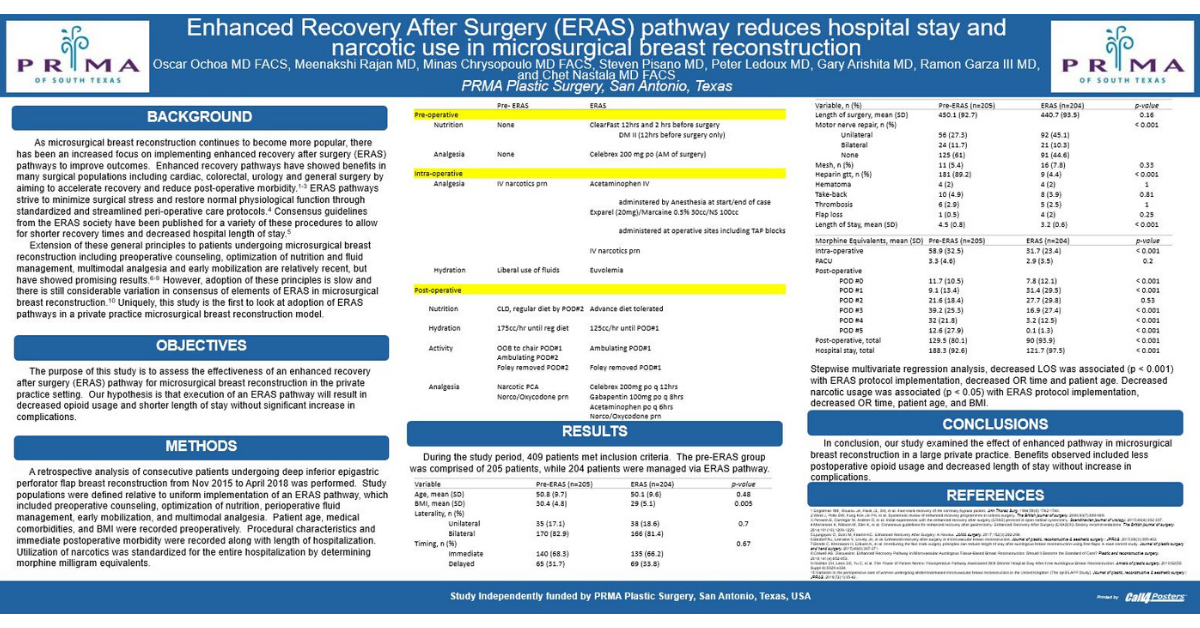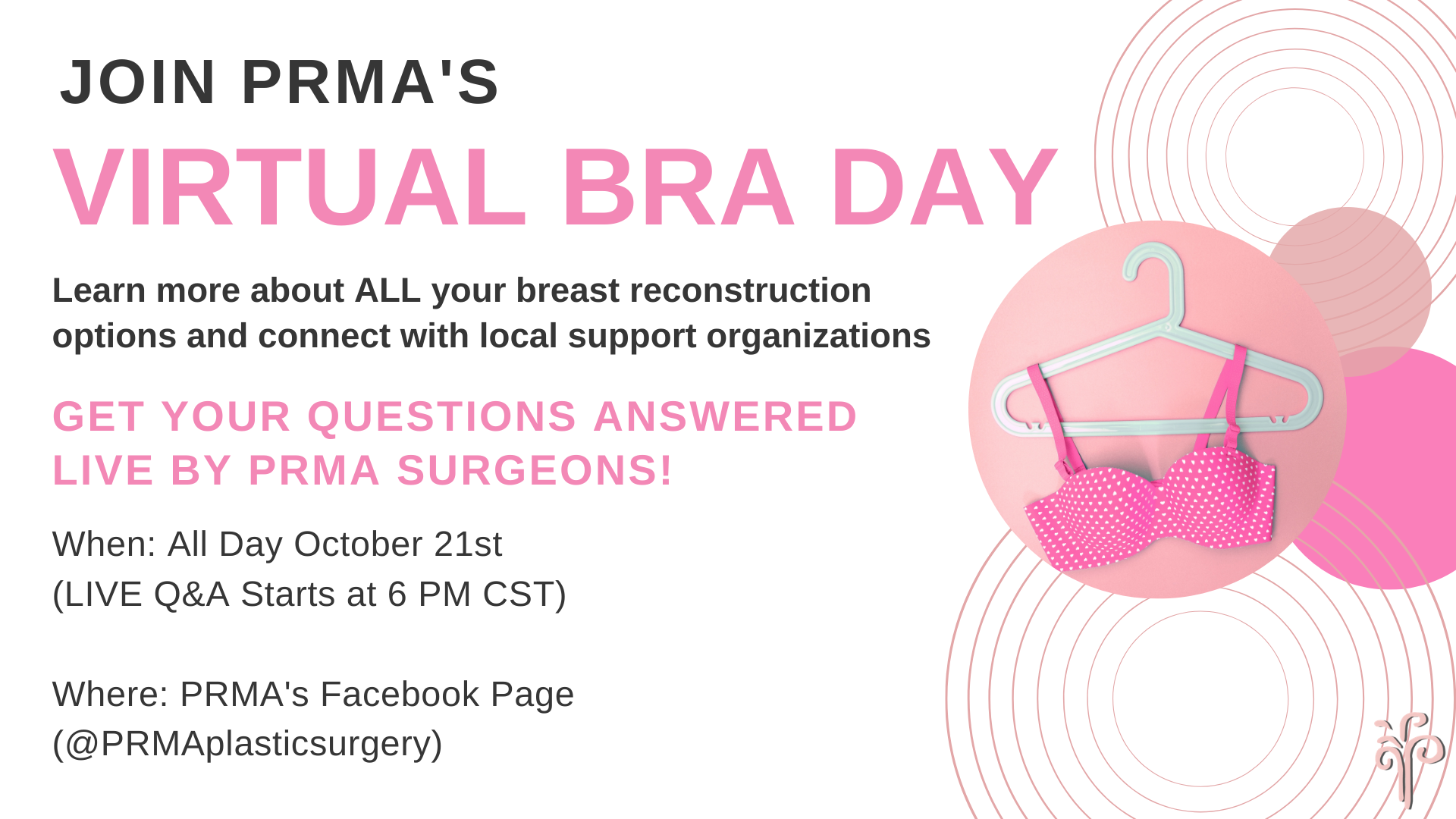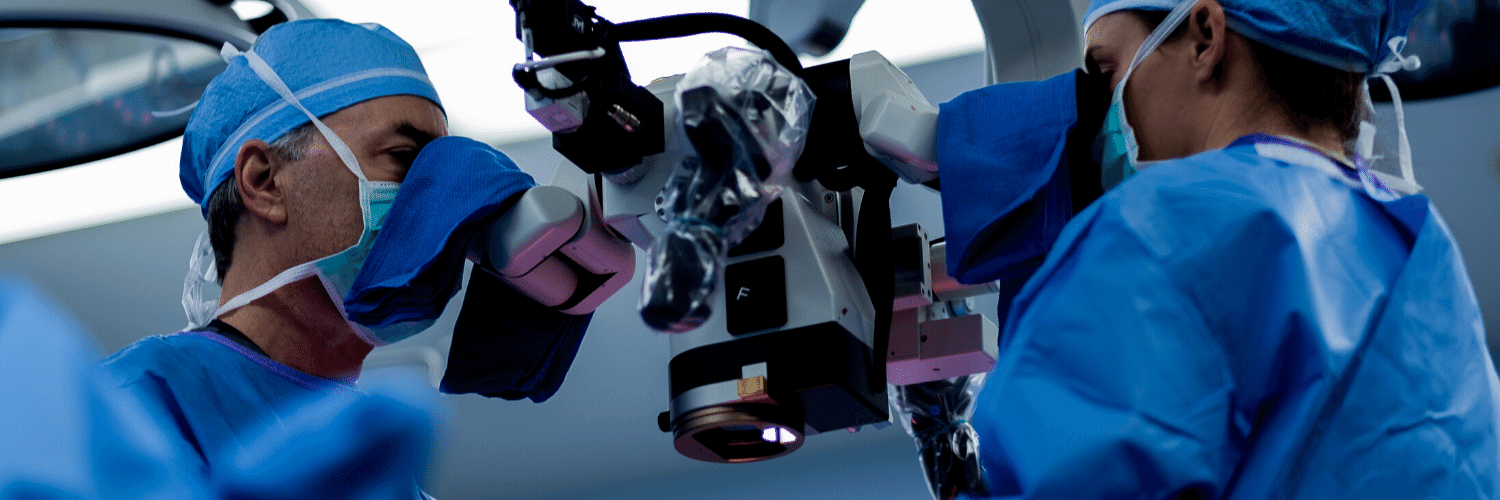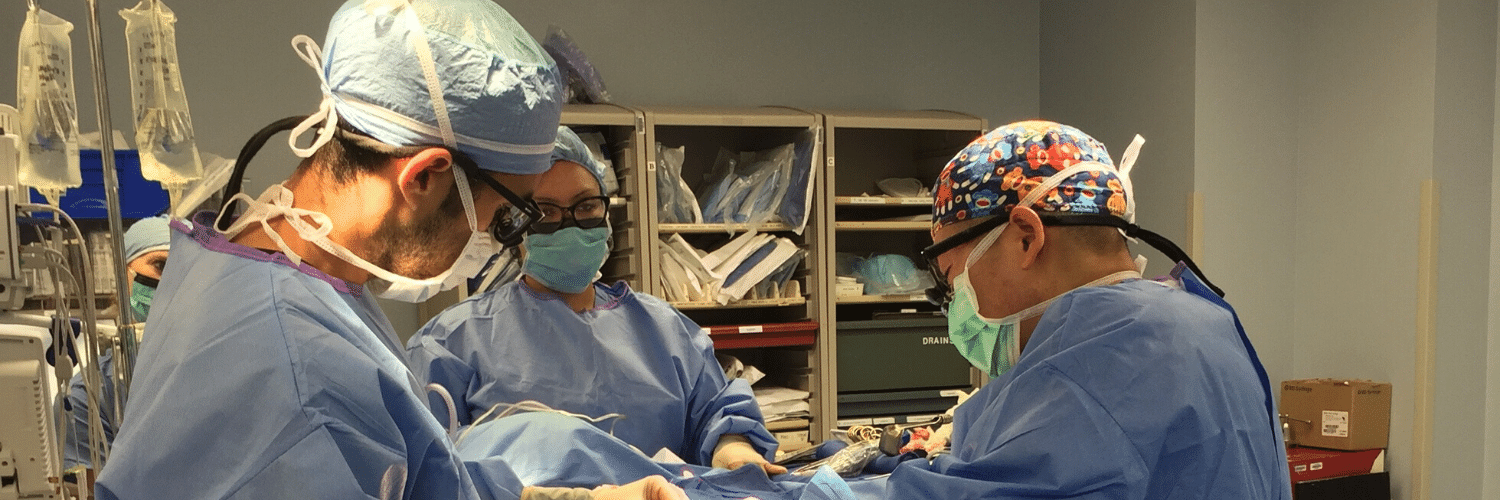Each year, healthcare experts and patient advocates gather in San Antonio to present the latest research findings and updates on clinical trials at the San Antonio Breast Cancer Symposium. This year, PRMA was honored to present our research finding from our Enhanced Recovery After Surgery (ERAS) protocol. Thanks to our ERAS protocol, our patients experience less pain, take little to no narcotics and are able to leave the hospital sooner after breast reconstruction surgery.
Here is the overview of our poster presentation on our ERAS study:
Background
As microsurgical breast reconstruction continues to become more popular, there has been an increased focus on implementing enhanced recovery after surgery (ERAS) pathways to improve outcomes. Enhanced recovery pathways have showed benefits in many surgical populations including cardiac, colorectal, urology and general surgery by aiming to accelerate recovery and reduce post-operative morbidity. ERAS pathways strive to minimize surgical stress and restore normal physiological function through standardized and streamlined peri-operative care protocols. Consensus guidelines from the ERAS society have been published for a variety of these procedures to allow for shorter recovery times and decreased hospital length of stay.
Extension of these general principles to patients undergoing microsurgical breast reconstruction including preoperative counseling, optimization of nutrition and fluid management, multimodal analgesia and early mobilization are relatively recent, but have shoed promising results. However, adoption of these principles is slow and there is still considerable variation in consensus of elements of ERAS in microsurgical breast reconstruction. Uniquely, this study is the first to look at adoption of ERAS pathways in a private practice microsurgical breast reconstruction model.
Objectives
The purpose of this study is to assess the effectiveness of an ERAS pathway for microsurgical breast reconstruction in the private practice setting. Our hypothesis is that execution of an ERAS pathway will result in decreased opioid usage and shorter length of stay without significant increase in complications.
Methods
A retrospective analysis of consecutive patients undergoing DIEP flap breast reconstruction from November of 2015 to April of 2018 was performed. Study populations were defined relative to uniform implementation of an ERAS pathways, which included preoperative counseling, optimization of nutrition, perioperative fluid management, early mobilization and multimodal analgesia. Patient age, medical comorbidities, and BMI were recorded preoperatively. Procedural characteristics and immediate postoperative morbidity were recorded along with length of hospitalization. Utilization of narcotics was standardized for the entire hospitalization by determining morphine milligram equivalents.
Results
During the study period, 409 patients met inclusion criteria. The pre-ERAS group was comprised of 205 patients, while 204 patients were managed via ERAS pathway. Step wise multivariate regression analysis, decreased LOS was associated (p< 0.001) with ERAS protocol implementation, decreased OR time and patient age. Decreased narcotic usage was associated (p < 0.05) with ERAS protocol implementation, decreased OR time, patient age and BMI.
Conclusions
In conclusion, our study examined the effect of enhanced pathway in microsurgical breast reconstruction in a large private practice. Benefits observed included less postoperative opioid usage and decreased length of stay without increase in complications.
You can learn more about our ERAS protocol HERE.
Author: Dr. Oscar Ochoa and Courtney Floyd

Thanks to our ERAS protocol, our patients experience less pain, take little to no narcotics and are able to leave the hospital sooner after breast reconstruction surgery.
Leave Comment
Sign Up for Our Monthly Newsletter
Continue Reading

Breast Reconstruction Surgery and Your Period
Breast Reconstruction Surgery and Your Period December 02, 2020 Share on Facebook Twitter Linkedin During our pre-operative appointment with patients, a topic that occasionally arises is menstrual cycles. It is completely normal for women to experience changes with their periods throughout breast cancer treatments. These can be temporary or permanent. Periods can be unpredictable following […]

What Bras and Abdominal Girdles to Wear After Breast Reconstruction Surgery
What Bras and Abdominal Girdles to Wear After Breast Reconstruction Surgery November 17, 2020 Share on Facebook Twitter Linkedin When preparing for breast reconstruction surgery, many patients want to know what types of bras and abdominal girdles they should plan to wear after surgery. Although every surgeon has slightly different preferences, we have put together […]

My 5 DIEP Flap Realities | A Guest Blog From Julie
My 5 DIEP Flap Realities October 28, 2020 Share on Facebook Twitter Linkedin Hi everyone, my name is Julie from It’s a Bosom Thing. I am so happy to be here as a guest blogger and have this opportunity to share with you a few thoughts about life after DIEP Flap Surgery. I was diagnosed […]

PRMA’s BRA Day Virtual Event Recap
PRMA’s BRA Day Virtual Event Recap September 08, 2020 Share on Facebook Twitter Linkedin Yesterday we celebrated Breast Reconstruction Awareness day! Although we missed seeing everyone in person this year, we were still able to spread education and awareness on ALL reconstructive options through our virtual efforts. We were also able to share information on […]

Second Stage DIEP Flap Surgery
Second Stage DIEP Flap Surgery September 08, 2020 Share on Facebook Twitter Linkedin DIEP flap breast reconstruction is typically comprised of at least two stages for the best outcomes. The second stage of surgery is commonly referred to as the “revision” stage and is usually performed about three months after the initial reconstruction. The purpose […]

If ‘Flaps’ Are Such A Great Breast Reconstruction Option, Why Doesn’t Everyone Get Them?
If ‘Flaps’ Are Such A Great Breast Reconstruction Option, Why Doesn’t Everyone Get Them? September 08, 2020 Share on Facebook Twitter Linkedin Flap-based breast reconstruction procedures, like the DIEP flap, offer patients a safe, natural implant-alternative option to reconstruction after a mastectomy. Flap surgeries are permanent and are associated with fewer complications after radiation when […]

What is a Skin Island and How is it Used in Breast Reconstruction?
What is a Skin Island and How is it Used in Breast Reconstruction? September 08, 2020 Share on Facebook Twitter Linkedin What is a “skin island”? The term “skin island” is used to describe the remaining visible skin from a transplanted “flap” of tissue. In the setting of DIEP flap breast reconstruction, the skin island […]

Comparing APEX Flap and DIEP Flap Breast Reconstruction
Comparing APEX Flap and DIEP Flap Breast Reconstruction August 10, 2020 Share on Facebook Twitter Linkedin We have been receiving numerous inquiries about the “APEX flap” recently. Patients want to know what it is and how it differs from the DIEP flap. APEX is an acronym that stands for “Abdominal Perforator Exchange”. Many patients believe […]

Monitoring the Health of Your Flap During & After Surgery
Monitoring the Health of Your Flap During & After Surgery July 21, 2020 Share on Facebook Twitter Linkedin Autologous flap (or tissue) breast reconstruction procedures represent today’s most advanced options for rebuilding a breast(s) following mastectomy. The most commonly performed method of flap-based reconstruction at PRMA is the DIEP flap. During this procedure, surgeons transplant skin […]

COVID-19 and the Impact on Cancer Patient’s Mortality
COVID-19 and the Impact on Cancer Patient’s Mortality July 21, 2020 Share on Facebook Twitter Linkedin There is still so much we do not know about COVID-19. Likewise, there is little known about how this disease impacts mortality for cancer patients. A study published in The Lancet evaluated and characterized the outcomes of patients with cancer […]

No Comments